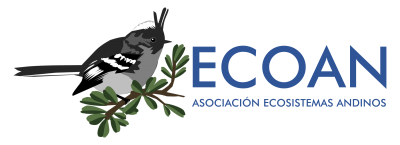While Acción Andina was founded by US nonprofit Global Forest Generation (GFG) and Peruvian nonprofit Asociación Ecosistemas Andinos (ECOAN) in 2018, its roots go back much further. It was built on a foundation of friendship and common vision which began over two decades ago with conservation leaders Constantino (Tino) Aucca, and George and Rita Fenwick. In 2017, during a trip to visit Tino’s restoration project in Peru, the group, joined by co-founder Leslie Danoff, decided to launch Global Forest Generation to help achieve his dream of a large-scale, community led restoration initiative throughout the high Andes. In 2019, GFG hired Florent Kaiser as the Executive Director, and later CEO. Acción Andina has since then evolved into a significant multi-country initiative and is continuing its mission to restore forests across South America.
This initiative would not have been possible without the vision of our founders, Rita Fenwick, George Fenwick, and Leslie Danoff.

As Acción Andina’s lead implementing agency, ECOAN ensures quality project management, data collection and monitoring, and coordinates local partner communications to resolve day-to-day operational challenges and facilitate information exchange among partners.

As Acción Andina’s lead strategic partner, GFG guides long-term growth through capacity building, donor relationships, international communications, and agile conservation design that establishes a clear path towards long-term stability and a viable scaling model for the initiative.
Growing at altitudes up to 5,000 meters (16,400 feet) just beneath Andean glaciers, the hardy Polylepis is the world’s highest altitude forest. No other habitat is proportionally more important for all that it influences below.
Native Polylepis forests ensure that glacial melt is captured in their watersheds and reaches not only nearby mountain villages, but also the millions of people in lowland towns and cities who depend upon it, including for agriculture. The freshwater stored by Polylepis forests also feeds into the headwaters of of the Amazon.
Hard Science: with the program of spatial and temporal quantitative evaluations of water resources, after several years of evaluating the water flow of Polylepis sp. forests, we expect to show that areas with intensive reforestation have better water performance compared to areas without reforestation or with scarce reforestation. The forests of Queuña (Polylepis sp.) reduce the temperature and regulate the climate through a process called evapotranspiration, which consists of capturing CO2 particles and emitting water vapor.
Restored Polylepis forest ecosystems enable endemic species like the Spectacled Bear, Puma, and Andean condor to thrive. These mountain forests will increasingly be a refuge for the endangered bird, mammal, plant, reptile, and amphibian species able to migrate to higher ground to survive our warming planet.
The four-eyed frog (Pleurodema cinereum) is a small and charismatic amphibian that lives in the central Andes. The name comes from the glands on its back, which resemble another pair of eyes. This frog depends on the water sources in the mountains and is very susceptible to droughts and climate change.
The indigenous people of the high Andes are highly motivated to restore their lost forests for water security. Polylepis forests prevent soil erosion and flooding, enabling indigenous communities to continue sustainable farming on their ancestral lands and to maintain their cultures. Their work as forest stewards – growing saplings, planting trees, protecting forests – provides much-needed income.
Existing and new growth forests are nature’s enormous carbon sinks as carbon removed from the atmosphere is stored in every part of the tree as well as its soil. Polylepis forests ecosystems also protect the carbon sequestered in their wetlands.
Vital to Acción Andina’s holistic eco-restoration approach are our on-the-ground leaders and local communities. We are planting key native tree species where they will have the greatest environmental impact. The outcomes we seek are far-reaching, encompassing climate resilience, water security, biodiversity conservation, and enhanced community livelihoods.